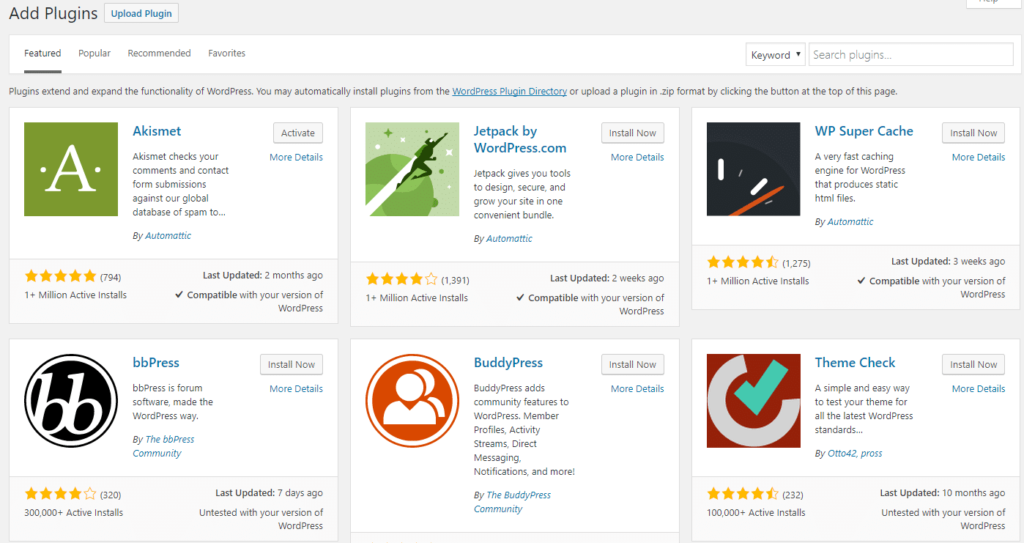Introduction to WordPress
WordPress, initially launched in 2003, has evolved from a modest blogging tool into one of the most versatile and widely-used content management systems (CMS) worldwide. Created by Matt Mullenweg and Mike Little, WordPress was developed as an open-source platform, allowing developers from all corners of the globe to contribute to its growth and enhancement. This collaborative effort has been pivotal in transforming WordPress into the robust and flexible CMS it is today.
One of the key attributes that distinguish WordPress is its open-source nature. Being open-source means that the source code of WordPress is freely available for anyone to view, use, modify, and distribute. This has fostered a large and active community of developers, designers, and users who continuously work to improve the platform by creating themes, plugins, and providing support. The WordPress community, being extensive and diverse, plays a significant role in its ongoing development and security enhancements.
WordPress’s adaptability is another reason for its widespread popularity. Whether you are looking to build a personal blog, a professional portfolio, an online store, or even a full-fledged corporate website, WordPress offers a solution. Its vast repository of themes and plugins enables users to customize their sites to meet specific needs without requiring extensive technical knowledge. This flexibility has made WordPress the platform of choice for millions of websites, ranging from small personal blogs to large-scale enterprise sites.

Today, WordPress powers over 40% of all websites on the internet, a testament to its reliability and user-friendly nature. The platform’s continuous growth and development, backed by its supportive community, ensure that it remains at the forefront of website creation technologies. Whether you are a novice or an experienced developer, WordPress provides the tools and resources necessary to build and maintain a successful website, blog, or online store.
Ease of Use and User-Friendly Interface
WordPress stands out as one of the most accessible platforms for building a website, blog, or online store, largely due to its intuitive design and user-friendly interface. Even those with no technical background can easily navigate the platform, thanks to its straightforward dashboard and clear organization.
The WordPress dashboard is designed to be simple and uncluttered, allowing users to find necessary tools and options without feeling overwhelmed.

A key feature contributing to the ease of use is the What You See Is What You Get (WYSIWYG) editor. This feature allows users to create and edit content in a way that closely resembles the final published product. Users can see exactly how their content will appear on the front end of their site, making it simple to make adjustments and ensure the final result meets their expectations. This visual approach eliminates the need for complex coding knowledge, making it accessible for beginners.
Additionally, WordPress offers drag-and-drop functionality through various plugins and themes. This feature simplifies the process of designing and customizing a website. Users can effortlessly add, remove, and rearrange elements on their pages without needing to write a single line of code. This functionality is particularly beneficial for creating visually appealing layouts and ensuring a cohesive design throughout the site.
Moreover, WordPress provides a wealth of tutorials, guides, and community support, further easing the learning curve for new users. The extensive documentation and active forums mean that users can quickly find solutions to any challenges they encounter. This robust support system ensures that even the most inexperienced users can confidently build and manage their websites.
In summary, the combination of a user-friendly dashboard, the WYSIWYG editor, and drag-and-drop functionality makes WordPress an excellent choice for beginners looking to create a website, blog, or online store. The platform’s ease of use ensures that users can focus on their content and design without being bogged down by technical complexities.
Flexibility and Customization Options
One of the key reasons WordPress stands out as a premier platform for website creation is its unparalleled flexibility and customization options. Whether you’re building a personal blog, a professional website, or an elaborate online store, WordPress provides an extensive array of tools to cater to your specific needs and aesthetic preferences.
At the heart of WordPress’s flexibility are its themes and plugins. The platform boasts a vast library of both free and premium themes, each designed to offer a unique look and feel for your site. These themes are highly customizable, allowing users to adjust various elements such as layout, color schemes, and typography. This level of customization ensures that your website can align perfectly with your brand identity or personal taste.

In addition to themes, WordPress’s plugin ecosystem is incredibly robust. With thousands of plugins available, users can enhance the functionality of their websites without requiring extensive coding knowledge. Plugins can add features ranging from SEO optimization and social media integration to complex e-commerce capabilities and advanced security measures. This versatility makes it possible for users to build everything from simple blogs to sophisticated online stores with ease.
The combination of themes and plugins allows for a high degree of personalization, making WordPress suitable for virtually any type of website. For instance, a food blogger can use specialized themes and plugins to showcase recipes and integrate social media sharing, while a business owner might utilize e-commerce plugins like WooCommerce to manage products, payments, and customer interactions seamlessly.
Moreover, the WordPress community continually develops new themes and plugins, ensuring that users have access to the latest features and design trends. This ongoing innovation means that your WordPress site can evolve and adapt over time, maintaining its relevance and competitiveness in an ever-changing digital landscape.
In summary, WordPress’s flexibility and customization options are pivotal to its popularity. The extensive library of themes and plugins empowers users to tailor their websites precisely to their needs, making it an ideal choice for anyone looking to create a unique and functional online presence.
SEO Friendliness
One of the standout features of WordPress is its inherent SEO friendliness, which significantly enhances the potential for websites to achieve higher rankings in search engine results. WordPress is designed with clean code and semantic markup, making it easier for search engines to crawl and index content efficiently. The platform’s structure supports essential aspects of on-page SEO, including the use of proper heading tags, alt attributes for images, and customizable permalinks.
WordPress also offers a range of built-in SEO features that simplify the optimization process. For example, users can effortlessly create SEO-friendly URLs, manage metadata, and integrate social media, all from the WordPress dashboard. These capabilities are essential for improving a site’s visibility and driving organic traffic.
Additionally, the platform’s ecosystem includes powerful SEO plugins such as Yoast SEO and All in One SEO Pack. These tools provide comprehensive solutions for optimizing a website’s content. Yoast SEO, for instance, offers features like real-time content analysis, keyword optimization, readability checks, and the ability to manage meta descriptions and title tags. Similarly, All in One SEO Pack provides robust options for XML sitemap generation, Google Analytics integration, and advanced canonical URLs.
These plugins also assist with on-page SEO by offering suggestions for internal linking, analyzing keyword density, and ensuring that the content is both user-friendly and search engine optimized. By leveraging WordPress’s built-in features and additional plugins, site owners can effectively manage their SEO strategies, focusing on aspects such as keywords, meta descriptions, and overall site performance.
In essence, WordPress’s SEO capabilities, combined with the functionality of popular plugins, make it an ideal choice for anyone looking to enhance their website’s search engine ranking. This not only drives more traffic to the site but also contributes to its overall success and visibility in the digital landscape.
Security and Regular Updates
WordPress is renowned for its robust security measures, which are essential in protecting websites from various threats. The platform is supported by a dedicated security team of experts who continuously monitor and address potential vulnerabilities. One of the core strengths of WordPress is its commitment to regular updates. These updates often include essential security patches, which ensure that the platform remains resilient against newly discovered threats.
To further enhance security, WordPress offers a plethora of security plugins. These plugins provide additional layers of protection by offering features such as firewall protection, malware scanning, and login attempt limitations. Popular security plugins like Wordfence, Sucuri, and iThemes Security are widely utilized by site owners to safeguard their websites from malicious attacks.
Best practices for maintaining a secure WordPress site involve several key actions. Firstly, it is crucial to keep the WordPress core, themes, and plugins updated to their latest versions. These updates not only bring new features but also address security vulnerabilities that may have been identified. Secondly, using strong, unique passwords and implementing two-factor authentication can significantly reduce the risk of unauthorized access. Additionally, regular backups of the website ensure that data can be restored in the event of a security breach.
The importance of staying updated with the latest versions and patches cannot be overstated. Cyber threats are constantly evolving, and outdated software can be an easy target for attackers. By regularly updating the WordPress core, themes, and plugins, site owners can mitigate risks and maintain a secure online presence. In tandem with vigilant monitoring and the use of reputable security plugins, WordPress users can effectively protect their websites from potential security threats.
Community Support and Resources
One of the most compelling reasons why WordPress is an exceptional platform for building a website, blog, or online store is its extensive community support and resources. The WordPress community, comprising millions of users, developers, and enthusiasts across the globe, plays a pivotal role in ensuring users have access to a wealth of knowledge and assistance.
WordPress forums are one of the most prominent resources available. These forums are bustling with activity, where users can post queries and receive solutions from experienced community members. Whether it’s troubleshooting a technical issue or seeking advice on best practices, the forums are a treasure trove of information and support. Additionally, there are countless dedicated websites and online communities focused on WordPress, where discussions range from basic usage tips to advanced development techniques.
Beyond forums, the official WordPress documentation is an invaluable resource. Comprehensive and meticulously organized, the documentation covers every aspect of WordPress, from initial setup and configuration to advanced customization and optimization. This extensive repository of knowledge ensures that users, irrespective of their expertise level, can find detailed guides and instructions to help them navigate the platform effectively.
Tutorials are another cornerstone of WordPress support. Both official and third-party tutorials are readily available in various formats, including written guides, video walkthroughs, and interactive courses. These tutorials cater to different learning preferences and skill levels, empowering users to enhance their WordPress proficiency at their own pace.
For those seeking more personalized assistance, professional support services are also available. Many skilled developers and agencies specialize in WordPress, offering expert consultation, custom development, and maintenance services. These professionals ensure that users can leverage WordPress to its fullest potential, addressing specific needs and challenges that may arise during the website building process.
In essence, the collaborative and supportive nature of the WordPress community significantly contributes to its status as one of the best platforms for website creation. The extensive array of support resources ensures that users are never alone in their journey, fostering an environment where knowledge sharing and continuous learning thrive.
E-commerce Capabilities
WordPress is renowned for its flexibility and ease of use, and this extends seamlessly into the realm of e-commerce. One of the standout features that make WordPress a powerful platform for building online stores is its compatibility with the WooCommerce plugin. WooCommerce transforms a standard WordPress site into a fully functional online store, providing a myriad of features that cater to both small businesses and large-scale enterprises.

WooCommerce offers comprehensive payment gateway integration, allowing merchants to accept various forms of payment, including credit cards, PayPal, and even cryptocurrency. This flexibility ensures that customers have a smooth and secure checkout experience, which is crucial for driving sales and building trust.
Inventory management is another area where WooCommerce excels. The plugin provides robust tools for tracking stock levels, managing product variations, and even setting up automated notifications for low stock. These features help store owners maintain optimal inventory levels, reduce the risk of overstocking or stockouts, and streamline overall operations.
Customizable product pages are a cornerstone of the WooCommerce experience. Merchants can easily tailor product listings to highlight key features, add high-quality images, and include detailed descriptions. This level of customization ensures that each product page is not only informative but also visually appealing, enhancing the user experience and potentially increasing conversion rates.
Beyond WooCommerce, WordPress supports a variety of other e-commerce plugins and extensions, such as Easy Digital Downloads for selling digital products, and Ecwid for integrating with existing retail platforms. These additional plugins further extend WordPress’s e-commerce capabilities, making it a versatile choice for diverse business needs.
In summary, WordPress’s e-commerce capabilities, particularly through the use of plugins like WooCommerce, make it a robust solution for online stores. Features like payment gateways, inventory management, and customizable product pages, along with the availability of other e-commerce plugins, position WordPress as a top choice for building a successful online store.
Conclusion: Why WordPress Stands Out
WordPress has firmly established itself as a premier platform for building websites, blogs, and online stores, thanks to its unparalleled versatility, ease of use, and robust community support. As highlighted throughout the preceding sections, WordPress’s user-friendly interface and extensive range of themes and plugins make it an ideal choice for both beginners and seasoned developers. The platform’s flexibility allows for endless customization options, enabling users to create unique, professional, and fully functional websites tailored to their specific needs.
Moreover, WordPress’s strong community support is a significant advantage, offering a wealth of resources such as comprehensive documentation, forums, and tutorials to assist users at every stage of their website-building journey. This vibrant community continually contributes to the platform’s evolution, ensuring it remains current with the latest web development trends and technologies.
Additionally, WordPress’s SEO-friendly features facilitate better search engine rankings, driving more traffic to your site and enhancing its online presence. The platform’s seamless integration with various third-party tools and services further enhances its functionality, making it a one-stop solution for creating and managing diverse types of websites.
Given these compelling advantages, it is evident why WordPress stands out as a top choice for anyone looking to build a website, blog, or online store. Its blend of simplicity, flexibility, and extensive support makes it a powerful tool for achieving your online ambitions. Whether you are launching your first blog, setting up an e-commerce store, or developing a complex business website, WordPress offers the tools and resources necessary to bring your vision to life.
Considering these factors, we encourage you to explore WordPress for your next web project. Its proven track record and comprehensive capabilities make it a reliable and efficient platform that can adapt to your growing needs.



